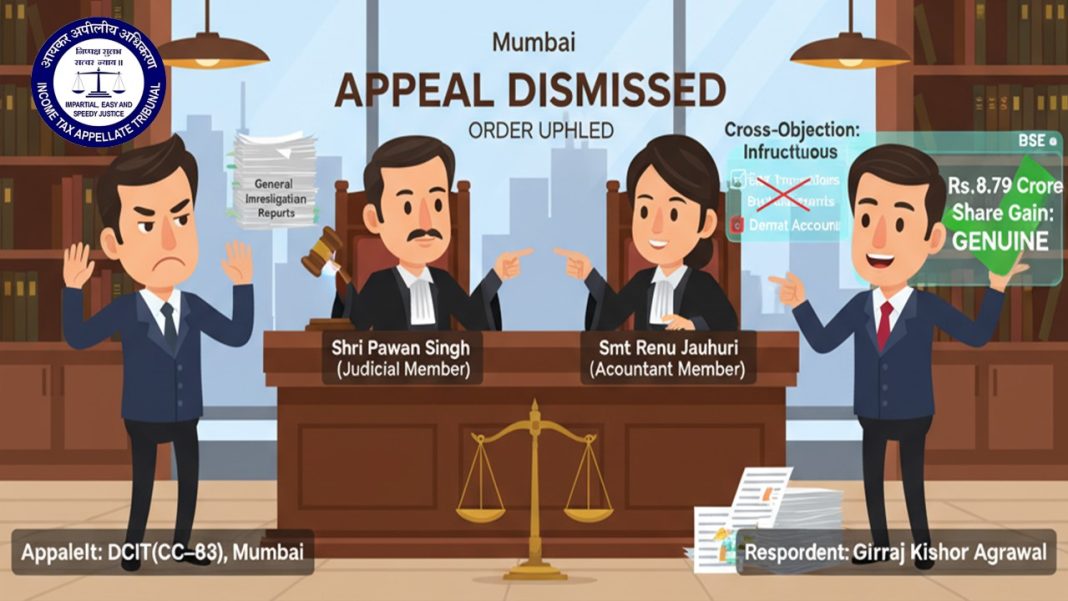ITAT Mumbai Upholds Rs. 8.79 Crore Share Gain as Genuine, Rejects Bogus Penny Stock Allegation
In a recent case of ITAT Mumbai, the tribunal ruled in favour of the assessee and rejected the appeal filed by the Revenue. Tribunal confirmed capital gains made by the assessee were genuine, and the tax department’s claim of bogus penny stock profits had no supporting evidence. The department relied merely on general investigation reports and did not bring any direct evidence against the assessee.
The present appeal has been filed by the DCIT(CC)–8(3), Mumbai (Appellant), against the Girraj Kishor Agrawal (Respondent), in the Income Tax Appellate Tribunal (ITAT) “G” Bench, Mumbai, before Shri Pawan Singh (Judicial Member) and Smt Renu Jauhri (Accountant Member). The case is related to the assessment year 2011-12. The hearing took place on September 25, 2025, and the final decision was announced on November 10, 2025.
Background of Case:
On October 31, 2011, the assessee filed his income tax return (ITR) for the assessment year 2011-12, declaring a total income of Rs. 892,321. The assessing officer (AO) completed its assessment on the case under section 143(1). Later, the case was reopened based on the information disclosed by the assessee.
Mr Agrawal had shown a long-term capital gain (LTCG) of Rs 8.79 crore from the sale of shares of M/s Shreenath Commercial and Finance Ltd during the year. The assessing officer (AO) declared this gain as bogus and added it to the income of the assessee under Section 68 of the Income Tax Act (unexplained cash credit). He also added an extra 3% (Rs. 26.39 lakh) as commission income, assuming it was paid to obtain fake capital gains.
Assessee’s Argument
In argument to the above action, the assessee stated that all share transactions were genuine.
- Shares were bought and sold through the Bombay Stock Exchange via a registered broker.
- All payments were made by cheque or RTGS.
- The transactions were properly recorded in the bank and Demat accounts.
- SEBI had not found any wrongdoing or manipulation involving him or the company.
- He also argued that the reopening of the assessment under Section 147 was invalid, as it was based only on general information from the Investigation Wing, not on any fresh or specific evidence against him.
CIT(A)’s Decision
When the assessee took the matter before the CIT(A), the authority accepted the evidence served by the assessee, noting all documents (purchase agreement, bank statement, Demat statement, broker notes, and SEBI declarations) were in order. The assessee was a regular investor, dealing in many different shares every year. SEBI had not accused him or the company of price rigging. In conclusion to the said findings, CIT(A) deleted the additions made by AO on the assessee.
Tribunal’s Findings
Revenue was dissatisfied with the action of CIT(A) and then filed an appeal before the ITAT Mumbai. The tribunal agreed with the observations made by CIT(A) and noted:
- The AO relied only on general investigation reports and did not bring any direct evidence against the assessee.
- The transactions were done on the stock exchange, and the sale proceeds came through banking channels.
- The jurisdictional High Court (Bombay) and Gujarat High Court have already held in similar cases that no addition can be made if the transactions are supported by valid documents and there is no proof of manipulation.
- The case law cited by the Department (Swati Bajaj by the Calcutta High Court) was not binding, as it was from a non-jurisdictional court.
Hence, the Tribunal dismissed the Revenue’s appeal and upheld the order of the CIT(A).
Cross-Objection
- Since the assessee had already won the case on merit, his cross-objection (regarding technical issues in reopening) was no longer relevant.
Final Order
- Revenue’s appeal: Dismissed
- Assessee’s cross-objection: Dismissed as infructuous
Citation: DCIT(CC) – 8(3), Mumbai Vs Girraj Kishor Agrawal (ITAT Mumbai); ITA No. 3769/MUM/2025; 10/11/2025; 2011-12



